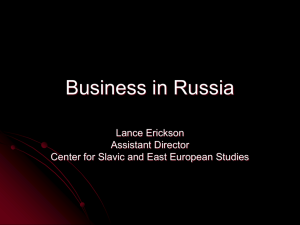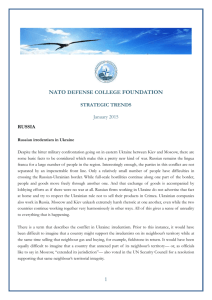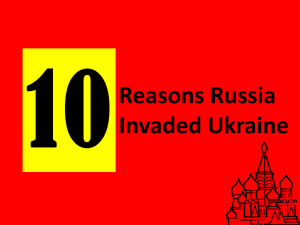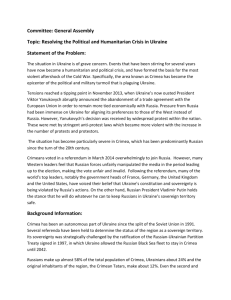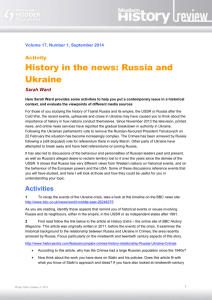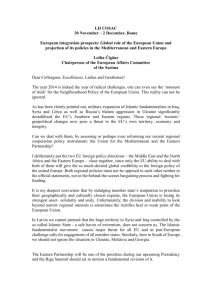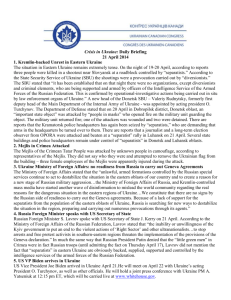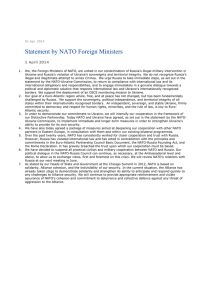Energy and Foreign Policy
advertisement
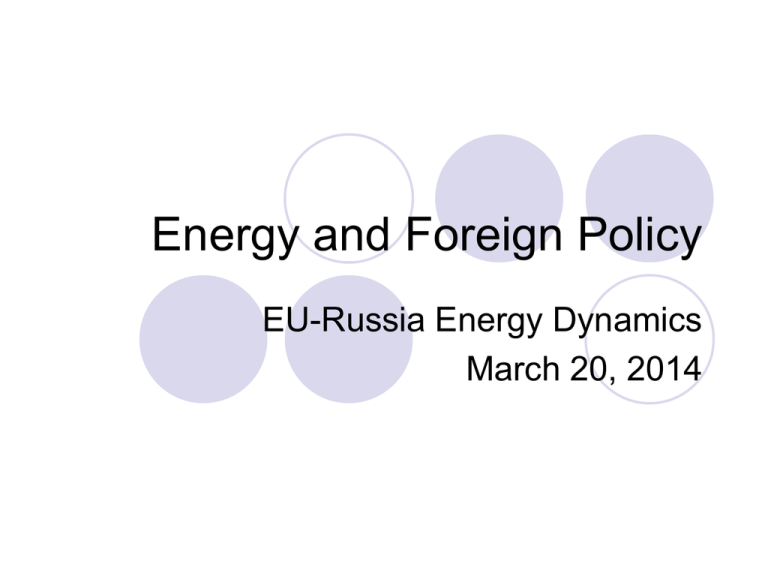
Energy and Foreign Policy EU-Russia Energy Dynamics March 20, 2014 Overview Role of energy in foreign policy The security of supply crisis Impact on European and Russian foreign policy Implications for current situation in Ukraine Why this case? Shows the growing importance of energy in foreign policy Highlights the challenges of interdependence in foreign policy Energy as a factor in foreign policy Natural resources long history of influence on foreign policy Level of significance depends on economic and political vulnerabilities of dependent states - energy dependence See energy as strategic resource Energy policy impacted by state, non-state and private actors Two key aspects of energy for FP The sovereign aspects of energy Energy as inherently territorialized Consolidating domestic and foreign status of the state Energy’s ability to significantly impact fortunes of a state Has major impact on revenue of energy producing states Role of energy in foreign policy Energy as indicator of national prosperity and underwrites national security Energy security as variable Security of demand Security of supply Energy as economic concern Maintaining supply and demand, minimize energy disruptions Role of energy in FP (Cont.) Energy as political concern Concern over potential leverage of exporter states over importer and transit states Energy as foreign policy tool Exporters - use to shape diplomacy, embargos and coercion Importer - soft power objectives, sanctions and motivation for conflict Russia: Energy exporter Three key aspects of power in Russian energy: Size and ownership of resource World’s largest gas exporter and second largest oil exporter Gazprom - state-owned Pipelines are also state-owned Long-term contracts Europe: Energy importer Most European states have little or no energy reserves On average EU is 30-50% dependent on Russian gas and 26-30% dependent on Russian oil Also dependent on transit countries to get that energy to it The transit states Countries between Russia and EU through which the pipeline pass Caught between pull of EU and Russia Transit countries dependent on revenue from energy moving through the pipelines but also dependent on the energy itself So dependent on both EU and Russia Ukraine key transit country with two major pipeline passing through it The crisis: The preamble Late 2004, tension arises between Ukraine and Russia over Ukraine’s inability to pay for Russian gas Previous Russia solution was to reduce supply to Ukraine Problem: Russia still needs to send gas to EU, so Ukraine just took from that portion Also have tensions over transit tariffs The crisis Two key causes: Remote cause- the Orange Revolution Ukraine government shifts towards Europe Russia sees itself losing influence of key region and further encroachment of West Proximate cause- inability of Ukraine to pay for Russian oil The crisis January 1, 2006 Russia cuts gas supplies to Ukraine Ukraine argues entitled to 15% of transit gas Result: several key European countries see gas deliveries drop by 14 to 40% Russia responds by increasing flow of gas on January 2 The crisis: aftermath Russia Argues crisis solely about Ukraine not paying for gas Reject any notion that stoppage was political Ukraine See stoppage as effort to show Russian disproval at Ukrainian shift towards West Impact on European & Russian FP Hardens European perceptions of Russian willingness to use energy as foreign policy tool Dramatically exposes European dependence Russian energy Puts need for common European energy policy on the agenda of the EU Energy now clearly seen as strategic issue Highlights interconnected nature of EU-Russian energy security Lessons for foreign policy Energy creates vulnerability in foreign policy for both exporter and importers Energy as important mediating factor in national and regional power relations Growing interconnections between states means conflict between two states can impact many others Further complicating foreign policy decision Implications for current crisis in Ukraine What are the implications from this for the current crisis? What does it tells about how we might expect the various actors will behave in the current situation?

